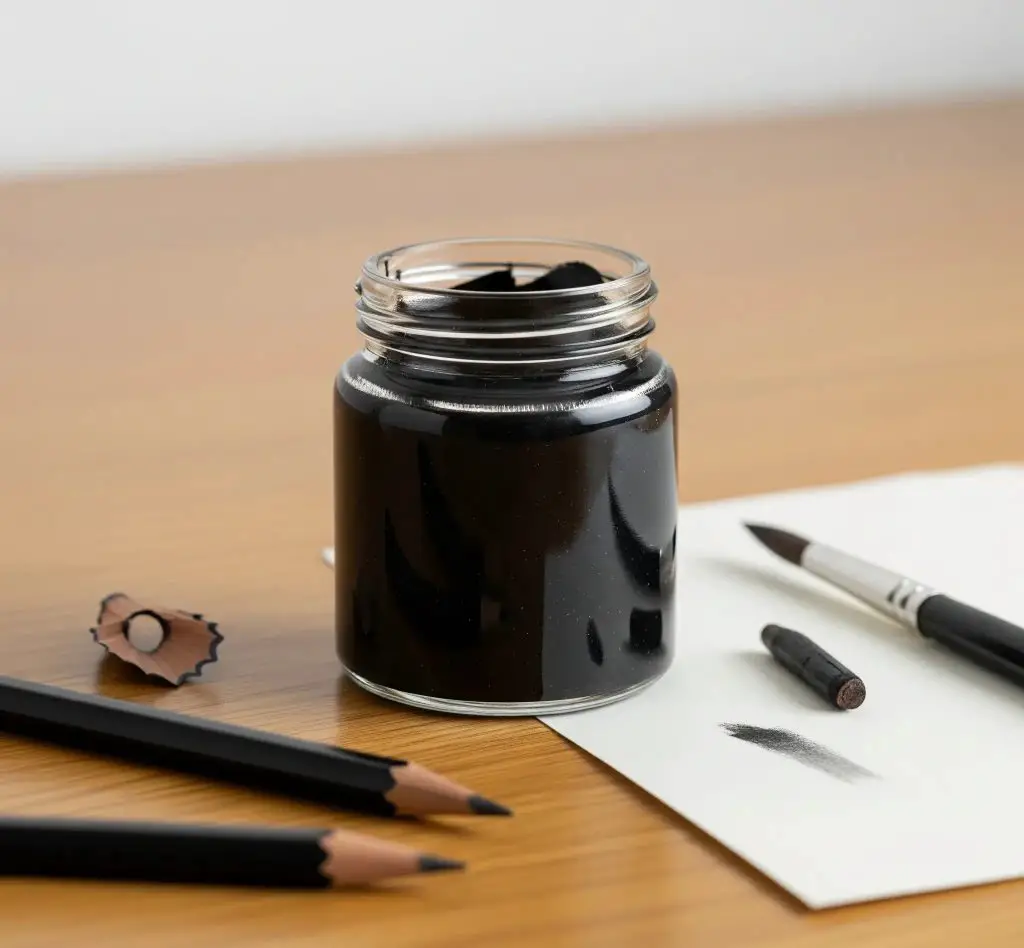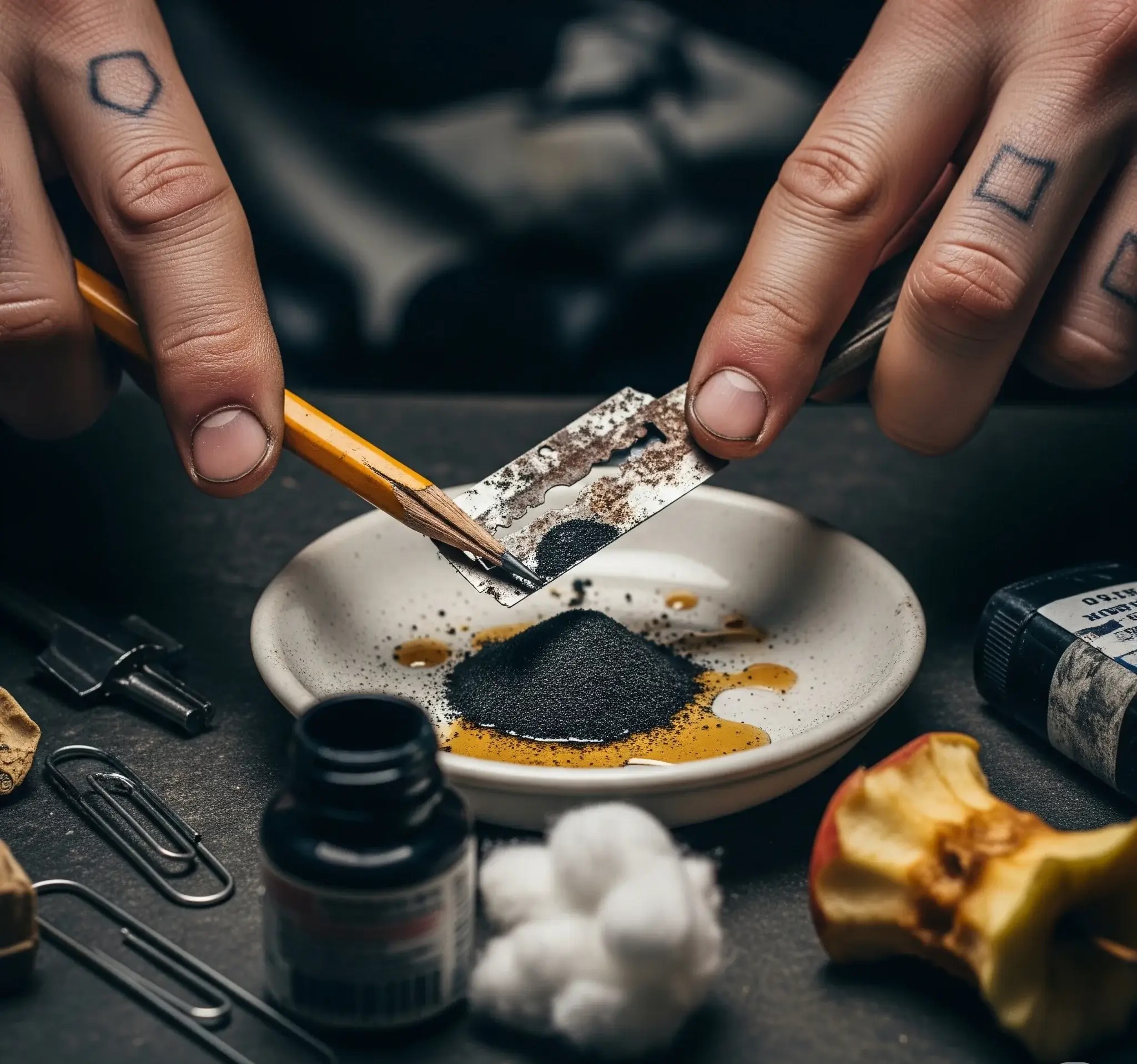Ever wondered if you can actually make tattoo ink at home using something as simple as a pencil?
Many people search for quick DIY tricks, but they don’t realize how risky some of these methods can be.
That’s why learning how to make homemade tattoo ink with a pencil needs careful explanation—not just the steps, but also the safety concerns.
This guide breaks it down in the simplest way so you understand what pencil ink really is, how people usually make it, and why experts strongly warn against using it on skin.
By the end, you’ll know whether it’s worth trying at all—or if there are better, safer options to explore.
What Is Homemade Tattoo Ink With a Pencil?
Homemade tattoo ink made with a pencil is exactly what it sounds like—an attempt to turn pencil graphite into usable ink for drawing tattoos.
People on the internet often experiment with this idea out of curiosity or because they don’t have access to professional tattoo ink.
The process involves breaking down the graphite inside a pencil and mixing it with liquid to create a dark solution that looks like ink.
Is It Safe to Make Tattoo Ink From a Pencil?
Safety is the biggest concern when talking about pencil ink. While the graphite inside pencils is non-toxic, the process of grinding it down and injecting it under the skin can be very harmful. Homemade ink is not sterile, and using it can lead to:
- Infections
- Skin irritation
- Poor healing
- Permanent scarring
That’s why professionals always recommend using sterile, store-bought tattoo ink.
Materials You’ll Need for Pencil Tattoo Ink
If you’re curious about how it’s made (for art experiments, not skin use), here are the basic items usually mentioned:
- A standard pencil (preferably HB or 2B)
- A lighter or flame source (to burn the graphite)
- A smooth surface or bowl
- Rubbing alcohol or water (as the liquid base)
- A spoon or small container for mixing
⚠️ Remember: this is for demonstration only. Do not use it for actual tattooing.

Choosing the Right Pencil for Ink Making
Not every pencil works the same. Artists usually prefer softer pencils like 2B, 4B, or 6B because they contain more graphite, which produces a darker powder when burned.
Hard pencils (like H or 2H) don’t release enough material and make weaker ink.
How to Extract Graphite From a Pencil?
To get graphite out of a pencil:
- Peel off the wooden casing with a knife or sharpener.
- Break the graphite stick into smaller pieces.
- Crush the pieces into powder using a spoon or flat surface.
This powder becomes the base ingredient for your “ink.”
Step-by-Step Guide: Making Ink From Pencil Lead
Here’s the most common method people share online:
- Place crushed graphite on a metal spoon.
- Heat the spoon with a lighter until the graphite starts turning to fine ash.
- Let the ash cool down completely.
- Transfer the ash into a clean container.
- Mix with a few drops of rubbing alcohol or water to create a paste-like liquid.
Mixing Graphite With Liquid for Tattoo Ink
The liquid you choose makes a big difference:
- Water: very weak and not long-lasting.
- Rubbing Alcohol: creates darker, smoother ink but can irritate skin.
- Homemade mixtures (like vinegar): not recommended because they smell and don’t mix well.
Most people mix until they get a thick, dark liquid that can be applied with a pen or brush.
How to Get the Right Consistency of Ink?
Good ink should not be too watery or too thick. To adjust consistency:
- Add a drop of liquid if the ink feels dry.
- Add more graphite powder if the ink looks thin.
- Stir until you have a smooth, black liquid that doesn’t separate quickly.
Tips for Testing Homemade Tattoo Ink
If you want to test it safely, avoid skin and use it on:
- Paper
- Cardboard
- Canvas
This way, you can see how dark and smooth your pencil ink actually looks without risking infection.
Can Pencil Ink Be Used for Real Tattoos?
Technically, you could try, but experts strongly advise against it. Pencil ink is not sterilized, and the skin is very sensitive to foreign particles. Using it for tattoos can cause:
- Long-term skin damage
- Ugly scars
- Faded or patchy designs
So, the answer is no—it’s not a safe option for tattooing.

Possible Risks of Using Pencil Tattoo Ink
If someone still decides to use pencil ink for tattoos, they might face:
- Bacterial infections
- Blood poisoning
- Severe allergic reactions
- Unclear tattoo lines that fade within weeks
Homemade Pencil Ink vs. Professional Tattoo Ink
- Homemade Pencil Ink: Cheap, unsafe, inconsistent color, short-lasting.
- Professional Tattoo Ink: Sterilized, safe, vibrant, long-lasting.
There’s a huge difference in quality, which is why professionals never use pencil-based ink.
Precautions Before Trying Homemade Tattoo Ink
If you still want to try making pencil ink (for art purposes only), keep these precautions in mind:
- Always wear gloves when handling burnt graphite.
- Use clean containers to avoid contamination.
- Never inject or apply it under the skin.
- Wash your hands thoroughly after handling.
Alternative DIY Tattoo Ink Methods (Safer Options)
Instead of pencil ink, some people experiment with safer DIY methods like:
- Wood Ash Ink: made by burning wood and mixing the ash with liquid.
- Soot Ink: created by collecting candle soot.
- Food Coloring Ink: non-toxic and more colorful for body painting.
These are still not perfect but are less risky compared to pencil ink.
Final Thoughts on Making Homemade Tattoo Ink With a Pencil
The idea of making homemade tattoo ink with a pencil might sound creative, but it’s not safe for real tattoos.
While it can be an interesting experiment for drawing on paper or testing how ink is made, it should never replace professional tattoo supplies.
If you truly want a tattoo, the best option is always to use high-quality, sterile ink from a trusted source.
Read More Blogs:
- How To Make Tattoo Ink With Charcoal?
- Does Tattoo Bubbling Go Away? Causes, Treatment & What To Avoid
- Can I Do Hot Yoga After A Tattoo?
- Can You Get A Tattoo In The Summer?
- Can You Do Laser Tattoo Removal While Pregnant?
- 13 Hocus Pocus Tattoos That Capture The Halloween Vibe
- Tattoo Flu: Symptoms And Prevention Guide
- 12 Bold Sagittarius Tattoo Ideas With Deep Meaning
- Can You Get A Tattoo If You Have Sensitive Skin? A Full Guide
- 13 Taurus Tattoo Ideas That Show Off Your Zodiac Power
- Top 12 Ghost Face Tattoo Designs To Try Now
- 10 Meaningful Kids Tattoos For Moms That Melt Your Heart
- Top 13 Pumpkin Tattoo Ideas For Halloween Lovers
- 12 Freddy Krueger Tattoo Ideas Every Horror Fan Will Love
- Top 12 American Flag Tattoo Designs To Inspire You
- 10 Stunning June Flower Tattoos With Meaning
- 13 Meaningful Blue Butterfly Tattoo Ideas For Women
